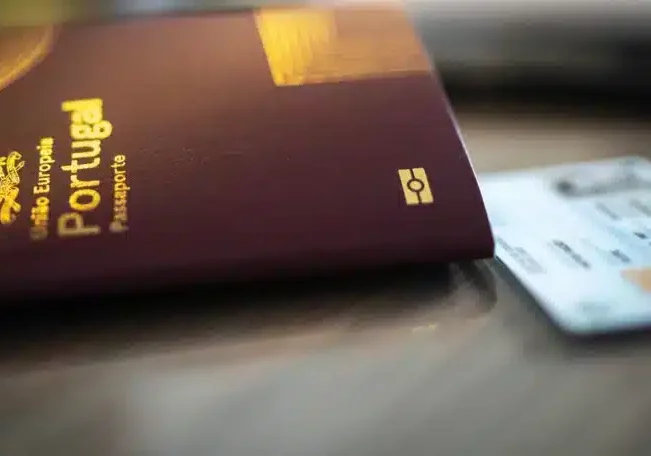Updated: January 16, 2025
Portuguese citizenship by descent, also known as citizenship by ancestry, allows you to acquire Portuguese nationality based on your familial ties to Portuguese citizens.
It is rooted in the principle of jus sanguinis (right of blood), which means nationality is passed down through the family line rather than by birthplace (jus soli).
In this article, we’ll take a look at:
- What Portuguese citizenship by descent is
- Benefits of Portuguese citizenship by descent
- Eligibility
- Required documents
- Application process
What is Portuguese citizenship by descent?
Portuguese nationality laws outline that children of Portuguese parents or grandparents may apply for citizenship, provided they can prove their lineage and meet documentation requirements.
This means that for individuals born outside Portugal, proving the lineage through birth and marriage certificates (apostilled and translated if necessary) is critical. You must have a direct ancestor, such as a parent or grandparent, who is or was a Portuguese citizen.
Benefits of Portuguese Citizenship by Descent

EU citizenship and mobility: Portuguese citizenship grants you full EU citizenship rights. This means you can live, work, and study in any of the 27 EU member states without the need for visas or additional work permits. It also provides freedom of movement across the Schengen Area, allowing visa-free travel to more than 180 countries worldwide.
High quality of life: You can enjoy the country’s exceptional quality of life, characterized by a mild climate, stunning landscapes, and rich cultural heritage. You gain access to affordable healthcare through Portugal’s national healthcare system, which is known for its comprehensive and high-quality services.
Dual citizenship: Portugal allows dual citizenship, meaning you don’t have to renounce your current nationality. This flexibility allows you to retain the rights and privileges of your existing citizenship while enjoying the benefits of being a Portuguese citizen.
Generational continuity: Portuguese citizenship can be passed down to your descendants, ensuring that future generations can also benefit from the opportunities and rights associated with being a Portuguese and EU citizen.
Economic and financial advantages: Portuguese citizens can access the EU’s single market, which simplifies cross-border business and investment opportunities.
Eligibility Criteria

The process of applying through a parent is generally straightforward; it requires evidence that one or both parents held Portuguese nationality at the time of the applicant’s birth. This can be demonstrated through official documents, such as the birth certificates of both the parent and the applicant, which confirm the parent’s Portuguese citizenship.
The requirements are a bit more complex for those applying through grandparents. In addition to proving the grandparents’ Portuguese nationality, the applicant may need to provide evidence of a meaningful connection to Portugal.
This connection can be shown through cultural ties, knowledge of the Portuguese language, or previous residence in Portugal. These criteria ensure that applicants possess more than just an ancestral link to the country, aligning with Portugal’s goal of integrating citizens who identify with its culture and heritage.
Applicants must submit authenticated and apostilled documents, including birth and marriage certificates, to establish their lineage. If the ancestor was born in a former Portuguese territory, such as Mozambique or Angola, during Portuguese rule, it is essential to verify the ancestor’s citizenship status to determine whether they retained Portuguese nationality after decolonization. This legal clarity is crucial for applications based on ancestry from colonial regions.
Essentially, eligibility hinges on meticulous documentation and often requires a connection to Portuguese culture, making it advisable to seek legal expertise to navigate the process efficiently.
Portuguese parent
As a Portuguese citizen, you can pass your citizenship to your children under several conditions. Portuguese nationality law allows for the transmission of citizenship to descendants, but the specific requirements depend on whether the child is born in Portugal or abroad and on the parents’ circumstances.
Automatic citizenship: If you are a Portuguese citizen and your child is born in Portugal, the child automatically acquires Portuguese citizenship at birth.
If your child is born outside of Portugal and at least one parent is Portuguese: If you are a Portuguese citizen and your child is born abroad, the child is entitled to Portuguese citizenship by descent.
To formalize Portuguese citizenship for a child born abroad, you must register the birth at the Portuguese civil registry or at the nearest Portuguese Consulate in the country where the child was born.
This process involves submitting a birth certificate and other documentation proving the parents’ identity and citizenship status.
Portuguese grandparent
If your grandparent(s) were Portuguese citizens, you’re also eligible to apply for Portuguese citizenship. However, for eligibility, you would need to prove your lineage, just as you would through a parent.
The process and documents required to claim citizenship through Portuguese grandparents are like those required to claim through parents, except that you would need to produce documentation proving the Portuguese nationality of your grandparent(s).
You must also demonstrate your relationship with your grandparent(s) through birth and marriage certificates.
To meet the requirements for residency in Portugal, you must demonstrate strong connections to the country, including a sufficient understanding of the Portuguese language.
Additionally, it’s necessary to have a clean criminal record with no prison sentences of three years or more for offenses punishable under Portuguese law.
Furthermore, there should be no indication of posing a danger or threat to national security or defense by engaging in activities associated with terrorism, as defined by the applicable law.
Portuguese Sephardic ancestry
The Organic Law No.1/2013 of 29 July states that the Portuguese government may grant nationality to the descendants of Portuguese Sephardic Jews who were expelled from Portugal in the fifteenth century. This law was implemented in 2015 and is still in effect.
The law recognizes the historical expulsion of Sephardic Jews from Portugal in 1496 and extends citizenship eligibility to their descendants. The law changed slightly last year for obtaining citizenship through Sephardic ancestry.
In addition to proving their links to a Sephardic community of Portuguese origin, all applicants will be required to have legal residence in Portuguese territory for a period of at least three years, consecutive or interpolated.
Applying for Portugal Citizenship by Descent
Applying for Portuguese citizenship by descent involves several steps. The process begins with identifying your claim to Portuguese ancestry, which can be through parents or grandparents.
A foreign national with a Portuguese parent or grandparent can apply for Portuguese nationality at the Institute of Registries and Notaries of the National Center for Migrant Integration (CNAIM) in either Lisbon or Porto.
Alternatively, applications can be submitted online if you have a legal representative, or in person at the Civil Registry or Portuguese Consulate in your area of residence.
To start your application for Portuguese citizenship by descent, gather the documentation that proves your lineage to a Portuguese citizen. This typically includes birth and death certificates, as well as marriage certificates that illustrate your family connection.
The type of documentation required and the process may vary slightly depending on your specific lineage. For instance, the steps for acquiring Portuguese citizenship through parents differ from the steps for doing so through grandparents.
Requirements Document
To apply for Portuguese citizenship by descent, you need to collect and submit several official documents. These documents are crucial for validating your lineage and providing essential identification information.
Here is a comprehensive list of the documents you will generally need when applying for Portuguese citizenship by descent:
Official application form: To begin, you will need an official application form. The applicant or their legal representative must complete this form and should include all pertinent identification information. It must be signed by one of these parties, and the signature needs to be notarized by a notary public.
Birth certificate: You will need to provide an original copy of your birth certificate issued in your country of residence. The birth certificate must include the names of both of your parents. Next, you will need copies of the ID of your Portuguese parent(s) or grandparent(s). If you are applying for citizenship through a parent, please ensure to include their ID as well.
Certified copy of the grandparent’s marriage certificate: If you apply for citizenship through a grandparent, you’ll need to provide an original copy of your grandparent’s marriage certificate.
Valid ID: A copy of your valid passport or ID is also necessary. This serves as proof of your identity and can also demonstrate ties to your country of residence (for example, if you regularly visit Portugal, own property there, etc.).
Background check: A criminal record check will be conducted.
Proof of affairs with Portugal: To apply for citizenship through this route, you must take a citizenship test to demonstrate your ties to Portugal. This can be accomplished by passing a
Portuguese proficiency exam, which assesses your knowledge of Portuguese as a foreign language. In the case of citizenship applications for grandchildren, the proof of these ties needs to be more specific.
Please keep in mind that the required documents may differ based on your specific lineage circumstances. For the most accurate information regarding your situation, contact the nearest Portuguese Consulate or Embassy. Make sure all your documents are properly certified and officially translated into Portuguese.
Any foreign document must be legalized in advance, either through the Apostille of the Hague Convention or by the Portuguese Consulate and Ministry of Foreign Affairs in the country where the document was issued. If the document is not in Portuguese, a translation by a translator recognized by the Portuguese Consulate is required.
Proficiency in the Portuguese Language

The following documents serve as acceptable evidence:
- Certificate of proficiency obtained from a Portuguese private school or public school
- Certificate of proficiency issued by the Portuguese Consulate during residency abroad, provided the Portuguese proficiency exam was taken through the Center of Evaluation of Portuguese Language (CIPLE) in Portugal or in other designated exam centers worldwide.
- Certification of proficiency in Standard European Portuguese as a second language from any authorized Portuguese Evaluation Centre.
- Diploma conferred by a recognized Portuguese public or private educational institution.
- Submission of the school diploma suffices for graduates of public or private schools in Portuguese-speaking countries.
Portuguese speakers of former Portuguese territories, such as Brazil, don’t need to prove proficiency in the language. However, they still need to prove they have ties with the Portuguese community.
Processing Time and Cost
Processing Portuguese citizenship applications may take a few months for the children of Portuguese parents, while it can take a couple of years in other situations. This extended duration is due to the various checks and procedures required to verify and confirm all the information provided.
The fee for Portuguese citizenship applications typically ranges from €175 to €200. Payment options generally include debit cards, Portuguese bank checks, or postal orders.
Goldcrest: How We Can Help You
Goldcrest is a buyer’s agent that is based in Lisbon. We provide expert, impartial advice on real estate investments and how to buy property in Portugal. From scouting out the perfect property through to property acquisition, we have you covered throughout the process.
If you are looking to purchase property in Portugal, don’t hesitate to get in touch. Our team of skilled experts is available to solve all your real estate doubts, helping you with the property search and offering insightful expertise and strategic advice.
Why choose Goldcrest?
- Local knowledge: With offices located across Portugal, our presence nationwide allows us to assist you personally across the country.
- Independent service: As an independent buying agent, we do not represent any development or project. Our service is entirely tailored toward each individual client, providing you with everything you need to secure the perfect property at the best possible price. As an impartial advisor on the market, we work solely on behalf of our client and provide a service tailored to your needs and requirements.
- Streamlined process: Our real estate agents speak English and Portuguese, and our service is completely focused on providing you with a hassle-free buying experience, saving you time.
- Experienced team: Our expert real estate team has a vast local knowledge of the Portuguese property market. We have cutting-edge technology and metasearch tools at your disposal to provide full market coverage, ensuring the best investment choices and negotiated prices.
- Network of partners: We have a close network of partners, including lawyers, property management services, builders, architects, designers, and landscape gardeners, again saving you time and hassle by providing you with trusted experts in their field of work.
Frequently Asked Questions About Portuguese Citizenship by Descent
Who is eligible for Portuguese citizenship by descent?
Individuals with at least one Portuguese parent or grandparent are eligible. Applicants must prove their direct lineage through official documents like birth and marriage certificates. In some cases, a demonstrated connection to Portugal may be required.
What documents are needed to apply?
Key documents include:
- Birth certificates of the applicant, parent(s), and grandparent(s) (apostilled and translated if needed).
- Marriage certificates, if applicable.
- Proof of Portuguese citizenship for the parent or grandparent (e.g., Portuguese ID or citizenship certificate).
Can I apply if my Portuguese ancestor was born in a former colony?
Yes, but it depends on whether the ancestor retained Portuguese nationality after decolonization. You may need additional documents to confirm their status at the time of your parent or grandparent’s birth.
Do I need to live in Portugal to apply for citizenship by descent?
No, residence in Portugal is not required for citizenship by descent. However, applicants claiming citizenship through grandparents may need to demonstrate a connection to Portugal, such as cultural ties or basic knowledge of the Portuguese language.
How long does the application process take?
Processing times vary but typically range from 6 months to 2 years, depending on the complexity of the case and the workload at the Civil Registry offices.
Does Portugal allow dual citizenship?
Yes, Portugal permits dual citizenship, so applicants can retain their current nationality while acquiring Portuguese citizenship.
Is there a language requirement for citizenship by descent?
No language requirement exists for applicants claiming citizenship through parents. However, applicants through grandparents may need to demonstrate basic knowledge of Portuguese, depending on the circumstances.
Can my children obtain Portuguese citizenship if I acquire it by descent?
Yes, Portuguese citizenship is inheritable. Once you are recognized as a Portuguese citizen, your children can apply for citizenship, maintaining the lineage.
Are there any fees involved in the application?
Yes, there are fees for processing the application, issuing certificates, and authenticating documents. Application costs vary but typically range from €175 to €300, excluding fees for translations and legal representation if needed.
What are the benefits of Portuguese citizenship by descent?
Benefits include EU citizenship rights, visa-free travel to over 180 countries, access to Portugal’s healthcare and education systems, and the ability to live, work, and study in any EU country. It also allows future generations to inherit Portuguese nationality.